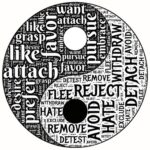“Alcohol has its own well-know defects as a medication for depression but no one has ever suggested – ask any doctor – that it is not the most effective anti-anxiety agent yet known.”
“”¢Blue Nights
To know me, is to know I speak for no one but myself, and I have no acronyms, degrees or doctor behind my name. What I do have are 30-plus years of drinking, coupled with anxiety, drugging and screwing up my life, followed with another 24.4 uninterrupted years of strong sobriety.
I’ve been over-anxious my entire life. So much so, that as a young pre-teen it manifested itself through nail-biting, aggressiveness, stuttering and more.
In junior high and into high school, I began experimenting with alcohol. It was as prevalent as water, so completely accessible. In the ’50’s and ’60’s, everyone I knew had a ‘corner bar’ tucked away in the corner of their basement, living room or card room cabinet. Drinking became the sign-of-the-times for many a household.
What came with this accessibility was a pervasiveness relating to relationships, addictions, even accidents. They were discussed either quietly or not at all. Alcoholism, right up there with mental health issues, were taboo and shoved somewhere else. The hope was that these and other personal problems would never see the light of day. These were dark family obstacles to an otherwise perfect home; the stuff Donna Reed and other shows during this time, were made of.
We could only imagine the insanity as “other” co-occurring events became obvious. Many of us with ADHD went undiagnosed, Obsessive-compulsiveness and other mental illness quirks were conveniently ignored for a hundred of reasons. Those with anxiety stayed confused, ignored and uninformed, written off in plenty of homes as ‘just a phase.’ Often, no one I knew had any answers because mental health “problems” were not acknowledged let alone discussed.
During these years, friends said they had the preverbal elephant in their living room. A common solution to pretend anxiety or alcohol among other problems in the didn’t exist was to, “don’t talk,”, “don’t feel,” and “don’t trust!” Another sign of the time were wall-to-wall carpets, where more than just a days’ worth of dirt got swept under. Silence was never golden, and became a thing of secrets in our homes that never left, until we did. Or so we thought.
By the time we exited the impenetrable fortress of secrets that were our home, we quickly learned that home was not the only place the bogyman lived. That sense of gloom and doom, the overwhelming helpless notion of paranoia and the world coming to an end follows until we learn much later there were positive ways to deal with our problems.
The relationship between alcohol, drugs, and anxiety.
Today, what we know is that anti-anxiety medication accounts for one-in-five admissions for addiction overdose. Statistics for those who drink alcohol while taking these or other Benzodiazepines at the same time are compelling and often prove deadly.
According to the National Institute of Mental Health, an estimated 40 million Americans meet the criteria for an anxiety disorder, and an estimated 31% of all U.S. adults will experience this condition at some point in their lives.
Anxiety can be absolutely debilitating, bringing on a host of other fears and isolating behaviors. But what it also brings is the false belief that alcohol has the power to soothe our ravaged souls and everything that ails us. And for a time, it does.
Those that engage in this behavior have better success with Russian Roulette.
ALCOHOL USE DISORDER (A.U.D.) = Alcoholism
If we have an alcohol use disorder (AUD) and experience anxiety, we likely feel these sensations with greater intensity because of the inducement of depression that comes with alcohol. Many of us want to isolate at work, at home, and with others. Our thinking soon begins its walk on the dark side of life. We believed nothing was working as we disappeared into ourselves. As a result of the overwhelming stress of anxiety, fear and anger grew.
Unless and until we stop drinking (which aggravates an already host of organs, stomach, throat, liver enzymes and more,) there is little hope that the effects of anxiety will ever be minimized!
A first recommendation would be to get a thorough medical examination to rule out any heart involvement and insufficiencies. Because alcohol is a classic depressant we have absolutely NO idea what it is doing to our insides.
As a chronic drinker/binger, you are at even greater risk of failing organs, and mental and emotional regression. After all, alcoholism is not unlike a cancer that never leaves us. The chaos that alcohol itself makes in brain connections, disruption of synapses and the unseen impact it has on all of the vital organs stays with us. Our disease waits for the next drink to begin where we left off, frequently creating even greater ramifications then when we began and can cause death.
Imagine being as young emotionally as you were when you began your drinking career? If we are still drinking regularly we remain mental midgets, with a maturity level same as the age we began regular and sustained drinking. Here we’ve become unable to discern certain scenarios with maturity and positivity, situations that normal people face every day. We couldn’t cope with the ravages of stress, make sound decisions, or communicate reasonably when under duress. These are but a few setbacks, regardless of our age.
Alcoholism is a disease that never-ever stops: With the aging process, physiologically and psychologically become evident in the way of lower respiration, heart rate, and blood flow to and through the brain.
Maybe you are already taking prescribed anti-anxiety and medication? If you’re drinking AND taking prescription medications, you’re setting yourself up for events that can impede life. Some of these actions we’re finding, lead to brain damage, coma, or death if the heart slows too much.
Here are several suggestions to reduce anxiety without the high risk of alcohol or drugs:
MINIMIZE ANGER: People already under stress from a myriad of conditions, children with mental health situations and adults with traumatic brain injuries are particularly at risk for overwhelming anger issues for which anxiety is at its core.
Recognize that in almost all situations, we have a choice (and responsibility,) to diffuse anger and the underlying effects of anxiety.
We do not have anger to use it against others. We haven’t learned the lesson of changing how we THINK about the situation. Ask yourself:
- What is my payoff for having this excitement (yes, it is emotional overload that hasn’t gotten the right attention yet). You see, it’s not about what’s-in-it-for-me that we’re after, it’s a cry for self-respect, maybe honor, or a simple request for recognition that screams we matter, or should matter.
Anger is always about a “lack of,” (self-esteem, self-compassion and self-love). It is the tool we knew since childhood to protect ourselves from others who fell short of our expectations. But as an adult, now that we know the answers are already within us, the questions today become,
- “Why do I need this anger in my life?”
- “Why do I allow this stress to overwhelm me?” and
- How is holding on to my stress, aggravation and anger helping me physically, emotionally and spiritually?
Recognize Triggers:
While our thoughts, actions or sounds are different for all of us, when we become aware that being aware is all that is needed to do something differently, it is your sign that you’re ready to move on some or all of these:
- Find a specific workaround/solution that speaks to you. Maybe it’s leaving the table, praying about the situation at hand; counting to ten, or even holding your breath. Whatever it is, anger is A Nasty Getting-EVEN Response. Anger begs for our attention, and is already within us. We don’t have to lead with stress, or anger any longer.

- Oftentimes the anger is repressed FEAR.
Question: What is the fear or fears buried deep underneath that exhibits as anger? Find the answer to that, and you can change your thinking; which, in turn, may change your anger. After all, it takes two as the saying goes.- Recognize that the adult within each of us (often not the parent or child,) has the answer to your frustrations.
- Find out what that trigger is, where it came from and what it is about, and you’re within reach of solving the problem!
- Realize that this too, shall pass. Say a prayer, “Dear __________, please give me the power to look at this differently.”
- Practice Mindfulness. This powerful application of meditation can bring about a peace and serene solution in the present moment.
The gift of mindfulness allows us to shift our focus OFF of our perceived problem, while providing insight to see and believe that right here right now, we are OK. It is in these moments that we breathe and are alive. We are not alive five minutes from now. Our world exists only where our feet are, and no-where else.
OTHER SOLUTIONS TO LETTING ANXIETY GO:
- Take a Hike! No really. A simple 20-minute walk-break each day can have a huge effect on your stress and your thinking.
Get outdoors, and look for gratitude in your breath, for the birds, for yourself that you took the initiative, that your fingers work, legs being propelled by you and more! With prayer of your design, you are beginning to see greater control over what-and-how you think because it is our thinking that makes or breaks us.
- Journal: That’s right. You don’t have to like it –but the effect of writing out our personal anger/resentment has the power to cut it in half. Talking with others minimizes the stress of holding and keeping it to ourselves. So, pick one or the other suggestion here or both, and minimize your thoughts. Soon, you will begin to see the big picture that “just like me” others have issues too! And the world and the people in it are not really out to punish us.
- STOP WHERE YOU ARE. When we are angry and stressed to the max, we have jumped to many conclusions, opinions and fear. Not only can we not think straight, we can’t make sense of anything!
Many of these conclusions, triggered by stress and negative emotions called stinking-thinking are not facts, they are imaginings. We call these”awfulizing!”
STOP here for a moment and look down at your feet. Here is the grounding and centeredness of your positive thinking that can change your thoughts. The energy is in the positive actions you take. This energy is the force, already within us, that changes the way we feel one moment, minutes, then hours and days at a time. But this is where it begins!
As we begin to harness this energy we find our emotional psyche is being accessed and used for the greatest good.
If we want control over our emotions, then we must be compelled to find a way to let the stress and the anger go, because we are all more powerful than our emotions, and need not let stress and anger define who we are today.
Harriet has recently written and was featured in Medium.com/AuthorityMagazine.
Her mission is to offer readers and viewers alike a healthy vantage point to live a stronger, more positive lifestyle through her own personal insights and experience. Like and Follow Harriet at Harrierhunter.org on Facebook, Twitter, LinkedIn and Instagram.


